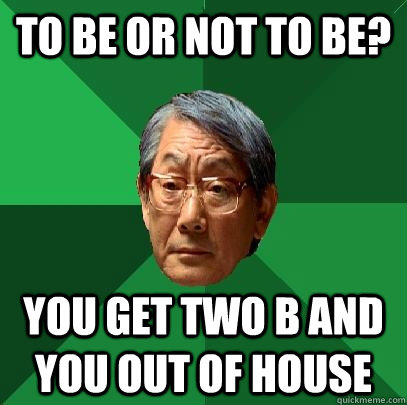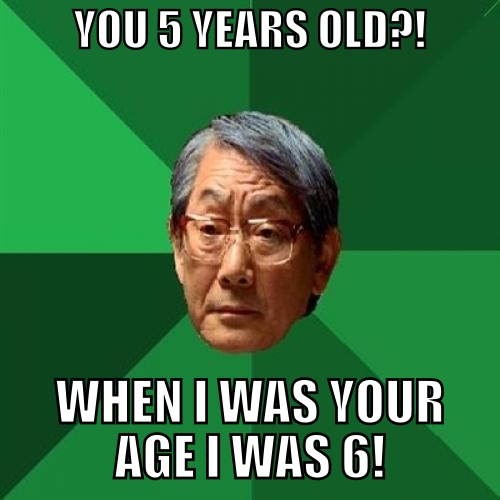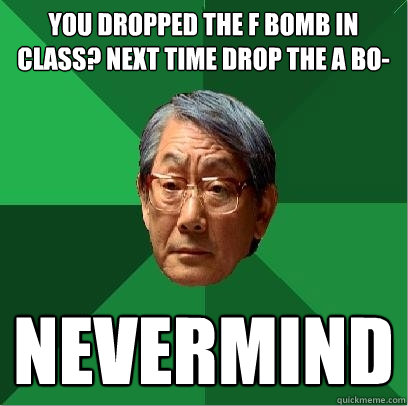Not Sure If Brilliant or Merely Pedestrian: Toward a Rhetoric of the Meme by Phill Alexander

Figure 11: High Expectations Asian Father, taken from blog of the same name.
The same rules apply when dissecting Asian Father. In this first example, Figure 11, the gatekeeper is knowing the comedy sketches/the comical stereotype of the demanding, English-as-second-language father. The replication is the obvious repeated image of the father, used in nearly all examples of this meme and easily found with a Google search. The statement made is the joke, but one could also take it as an attempt at social commentary on unrealistic parents pushing students too hard, in this particular case referencing another gatekeeper (Shakespeare) while creating comedy by misinterpreting the Shakespeare passage. Again it is discreet (a single image), can be transmitted easily, and Figures 12 and 13 illustrate just a few examples of it being retransmitted/encouraging recreation.

Figure 12: Another variation on High Expectations Asian Father, also from the self-titled blog
There is an extensive history of High Expectations Asian Father at the resource knowyourmeme.com. While this history catalogs first appearance (on the blog from which I retrieved these images, founded in 2010), the origin of the photograph (it’s South Korean actor Jeon Mu-Song, a man oft cast as the father or grandfather in movies), and catalogs the meme’s prime popularity and current saturation. There are, in fact, over 20,00 versions of it. What isn’t mentioned on knowyourmeme is that this meme is racially charged and arguably racially insensitive. The complaint is also absent from the Tumblr site hosting most of the submissions.

Figure 13: Another variation on High Expectations Asian Father, also from the self-titled blog
The racist origins of the meme were however food for discussion on Reddit. In an exchange wherein users were asked if they liked the meme, Reddit user zposse said:
The official name of the meme is "High Expectations Asian Father". Note the racial label in there. I think the closest thing I've seen to this meme are Sheltering Suburban Mom and, to a lesser extent, Almost Politically Correct Redneck. The problem is that these memes aren't considered a "universal experience" among non-POC's, otherwise the meme would be called "Sheltering Caucasian Mom". The very labeling of the HEAF meme doesn't help show the diversity of experiences within our own group. Anyway, I don't mind the meme. I just see a few double standards.
Reddit user Blandis added:
The thing about racist jokes is, you shouldn't make them to strangers. If you have the kind of relationship with your friend that establishes a non-racist context between you and an understanding that neither of you will take offense, go for it. But with strangers? You can't be sure. Since almost everyone on the internet is a stranger, you really shouldn't make racist jokes on the internet. Strangers, be they oppressed or oppressors, won't know the difference between your "pretend racism" and someone else's authentic racism. All of that said, High Expectations Asian Father proves to me that something can be funny but also racist. On the whole, I don't think it's good for Asian American representation, but I still laugh at its usage now and again.
Two interesting points emerge here. The first is zposse’s assertion that labeling the father’s race automatically makes the meme racist in some ways. While this seems simplistic, it carries power because it’s true. It’s not “Caucasian Wonka Is Sarcastic” or “White Guy George Martin Kills His Characters.” The meme opens observing difference, which could be taken as an attempt to recognize diversity or as a match meant to light a fuse somewhere in the dark.
The other fascinating take-away is Blandis’ assertion that there is “pretend” racism in order to make a joke and “authentic racism.” The debate over authenticity can be a slippery slope (see Walls, 2008), but taking the word at face value here, Blandis is putting forward the claim that racism meant for humor is inauthentic, presumably hypothesizing that it would carry less force. While I strongly disagree, this opinion seems to have traction in the meme community, and it could be entirely possible that those creating versions of High Expectations Asian Father believe they are exempt from being seen as hateful because they are making what they believe is a humorous rhetorical move.
This is of course a somewhat untenable position for someone who understands critical race theory and realizes that racism is racism based on reception and not on intent, but that understanding doesn’t necessarily extend into places like Reddit and 4chan. Those spaces, just like the memes being discussed here, have their own internal rules and gatekeeping mechanisms. It is very possible that while “pretend” racism doesn’t—and cannot—exist in the real world, these smaller communities might have created an illusion that makes such a classification possible. More research is needed on this front.